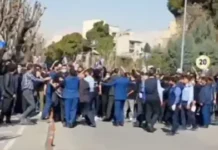Britain: Firefighters worked through the night to put out bushfires, and engineers scrambled on Wednesday to repair heat-damaged train tracks as Britain woke up to the consequences of the hottest day in its history.
Yesterday was the hottest day for the London Fire Service since World War II, when temperatures topped 40 degrees Celsius for the first time, sparking fires that destroyed dozens of buildings in the capital, and flames reached dry grasslands on both sides of railways and roads.
Trains running from London to the east coast of England were cancelled until at least this afternoon, Wednesday, after a fire broke out near the city of Peterborough in central England, damaging signalling equipment.
Other train network fires also damaged overhead rails and wires.
“Please do not travel to or from London Kings Cross today,” the operator of London Rail said, referring to the main station in the British capital. The Met Office said a record temperature of 40.3 degrees Celsius was recorded in Coningsby, in central England, on Tuesday.
The Met Office expected the temperature to drop a lot on Wednesday, with rain later.
The British government has been defending its record on the environment, promoting its own decision to reach net zero emissions.
However, ministers acknowledged that it could take years to upgrade the infrastructure to be able to adapt to rising temperatures.
On Monday, authorities had to close two airport runways due to damage to the roof.
The electricity companies were also forced to cut the power due to the heat that led to the burning of the equipment.
Many schools closed early, and zoos struggled to keep the animals cool.
London Mayor Sadiq Khan praised the work of the firefighters after they received 2,600 distress calls, compared to the usual daily average of 350 calls.
The London Ambulance Service received 400 calls per hour from people who developed heat exhaustion, breathing difficulties, dizziness and fainting.
“The problem is we haven’t had any rain for all of July in London,” Khan told the media. “The grass is like straw, which means it’s easy to burn, and once the fire hits, it spreads incredibly fast.”



